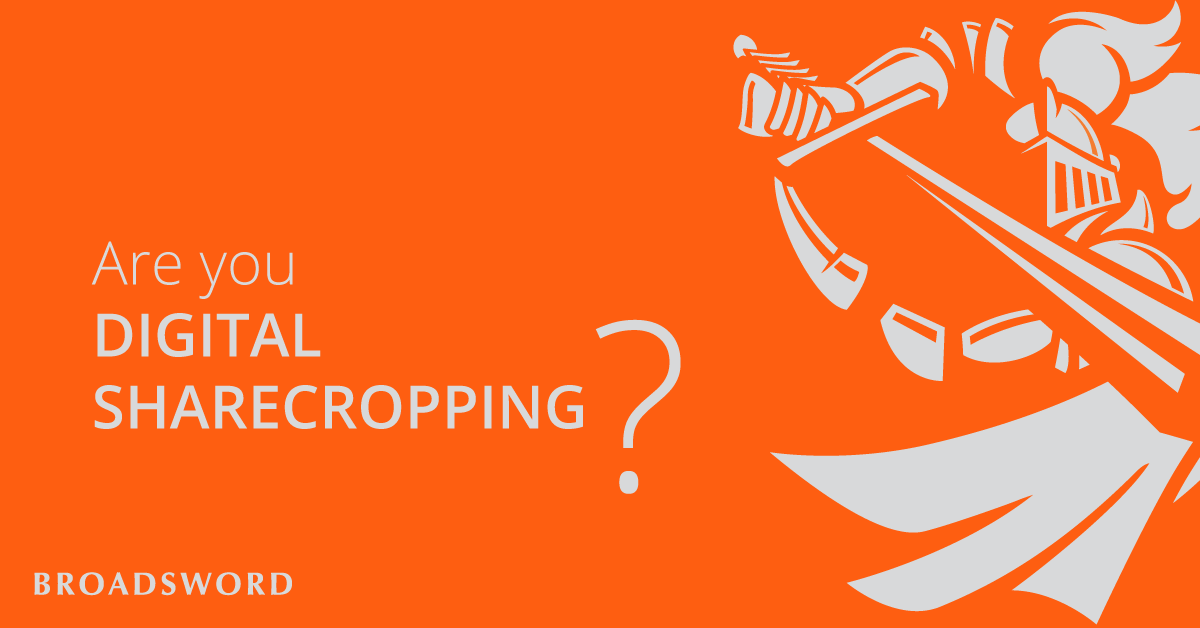Your business has never been better. You have embraced social media, sharing on Facebook, and tweeting your latest offers and news. You think that you are way ahead of the game but there is a danger in your business being solely dependent on another company, one that you have no control over.
What happens if, overnight, Facebook, Twitter and Instagram disappear? What happens to all your content – photos, articles, documents? Unlikely admittedly, but what happens to your online presence? Have you become victim to digital sharecropping?
The term digital sharecropping was first used in 2006 by Nicholas Carr, a renowned author on technology and culture, to describe a characteristic of Web 2.0. He pointed out that despite an ever increasing amount of web content becoming available, web traffic was growing more concentrated in a small number of sites. Even though the methods for measuring traffic were not entirely accurate, the trend was clear: a few big sites were increasingly dominating the web. Using the analogy of sharecropping, or farming practices commonly used after the U.S. Civil War, Carr likened websites such as Facebook to wealthy landholders who allowed individual farmers or small businesses to work the land but keep the majority of the profits.
Explaining further, Sonia Simone of Rainmaker Digital puts it in simple terms: “Anyone can create content on sites like Facebook, but that content effectively belongs to Facebook. The more content we create for free, the more valuable Facebook becomes. We do the work, they reap the profit.”
“If you’re relying on Facebook or Google to bring in all of your new customers, you’re sharecropping. You’re hoping the landlord will continue to like you and support your business, but the fact is, the landlord has no idea who you are and doesn’t actually care.”
For example, what if you solely used Facebook to reach your target audience and market your product? It’s free and everybody uses it. Surely it’s a win win situation. But what happens when Facebook thinks you’ve done something that violates their terms of service and deletes your account? Or changes the way you’re allowed to talk with your customers? Or decides what your customer/fan sees? Which it already has. Or decides you need to pay for those eyeballs? Which it already has…
“If you’re relying on Facebook or Google to bring in all of your new customers, you’re sharecropping. You’re hoping the landlord will continue to like you and support your business, but the fact is, the landlord has no idea who you are and doesn’t actually care,” says Sonia Simone.
“The other problem with sharecropping is that the landlord may or may not be here next year. Sharecroppers have put millions of hours into sites like Digg or MySpace, which still exist but are no longer bringing the traffic they once did.”
Search and social sites such as Facebook and Google are valuable marketing tools, and channels, but should be viewed as that rather than the sole focus of your marketing efforts. The majority of your time should be concentrated on creating marketing assets that you own and control.
Sonia Simone (and Broadsword) suggests that you concentrate your efforts in building in the following three areas:
- A well-designed website with your own hosting
- An opt-in email list
- A reputation for providing impeccable value
Your website is the only thing online that you have absolute control over. It is much wiser to get it right from the start – invest your time, money and energy in your own hosted account. Plant it, nurture it, rotate crops, and reap the benefits of its many harvests.
Put up what you want, when you want, in the format you want, and use all the marketing tools (including social media) at your disposal to drive traffic to this marketing farm that you have 100% control over.
Read more on this topic:











